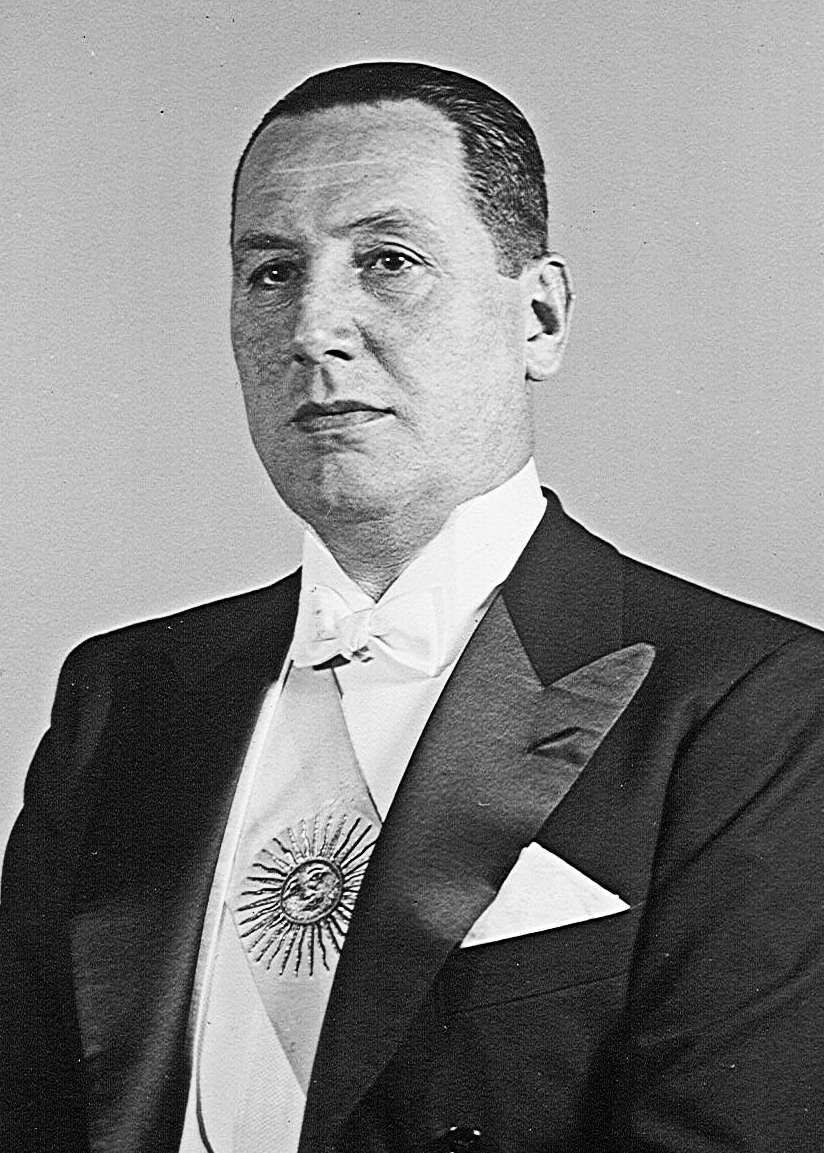Juan Perón
 Juan Domingo Perón (, , ; 8 October 1895 – 1 July 1974) was an Argentine lieutenant general and statesman who served as the 29th president of Argentina from 1946 to his overthrow in 1955, and again as the 40th president from 1973 to his death in 1974. He is the only Argentine president elected three times, and holds the highest percentage of votes in clean elections with universal suffrage. Perón is the most important and controversial Argentine politician of the 20th century, and his influence extends to the present day. Perón's ideas, policies and movement are known as Peronism, which continues to be one of the major forces in Argentine politics.
Juan Domingo Perón (, , ; 8 October 1895 – 1 July 1974) was an Argentine lieutenant general and statesman who served as the 29th president of Argentina from 1946 to his overthrow in 1955, and again as the 40th president from 1973 to his death in 1974. He is the only Argentine president elected three times, and holds the highest percentage of votes in clean elections with universal suffrage. Perón is the most important and controversial Argentine politician of the 20th century, and his influence extends to the present day. Perón's ideas, policies and movement are known as Peronism, which continues to be one of the major forces in Argentine politics.Perón's presidencies were highly influential for initiating industrialization in Argentina, expanding social rights (for workers, children, women and the elderly) and making public university tuition-free. Alongside his wife, Eva Duarte ("Evita"), they also pushed for women's suffrage, provided charity and built approximately half a million houses. Due to these policies, they were immensely popular among the Argentine working class. His government was also known to employ authoritarian tactics; many dissidents were fired, exiled, or arrested, and much of the press was closely controlled. Several fascist war criminals, such as Josef Mengele, Adolf Eichmann, and Ante Pavelić, were given refuge in Argentina during this time.
On March 1, 1911, Perón entered military college, graduating on December 13, 1913. Over the years, he rose through the military ranks. In 1930, Perón supported the coup against President Hipólito Yrigoyen, a decision he would later come to regret. Following the coup, he was appointed professor of Military History. In 1939, he was sent on a study mission to Fascist Italy, and then traveled to other countries including Germany, France, Spain, Yugoslavia and the Soviet Union. It was during his stay in Europe that Perón developed many of his political ideas. Perón participated in the 1943 Revolution and held several government positions, including Minister of Labor, War and Vice President. There, he would become known for adopting labor rights reforms. Political disputes forced him to resign in early October 1945, and he was later arrested. On October 17, workers and union members gathered in the Plaza de Mayo to demand his release. Perón's surge in popularity helped him win the presidential election in 1946.
Perón was re-elected by a fairly wide margin, though his second term (1952–1955) was more troubled. Eva, a major source of support, died a month after his inauguration in 1952. The religious tolerance of the government and the charity made by the Eva Perón foundation (historically provided by the church) damaged his standing with the Catholic Church. After an attempt to sanction the divorce law and deporting two Catholic priests, he was mistakenly thought to have been excommunicated, and pro-Church elements of the Argentine Navy and Air Force backed by the United States government bombed Plaza de Mayo in Buenos Aires in June 1955. More than 300 civilians were killed in this coup attempt, which in turn prompted violent reprisals against churches by Perón's supporters. Within months, a successful coup deposed him.
During the following period of two military dictatorships, interrupted by two civilian governments, the Peronist party was outlawed and Perón was exiled. Over the years he lived in Paraguay, Venezuela, Panama, and Spain. When the Peronist Héctor José Cámpora was elected president in 1973, Perón returned to Argentina amidst the Ezeiza massacre and was soon after elected president for a third time (12 October 1973 – 1 July 1974). During this term, left- and right-wing Peronists were permanently divided and violence between them erupted, which Perón was unable to resolve. His minister José López Rega formed the Argentine Anticommunist Alliance, believed to have committed at least hundreds of extrajudicial killings and kidnappings. Perón's third wife, María Estela Martínez, known as Isabel Perón, was elected as vice president on his ticket and succeeded him as president upon his death in 1974. Political violence only intensified, and she was ousted in 1976, followed by a period of even deadlier repression under the junta of Jorge Rafael Videla.
Although they are still controversial figures, Juan and Eva Perón are nonetheless considered icons by the Peronists. The Peróns' followers praised their efforts to eliminate poverty and to dignify labour, while their detractors considered them demagogues and dictators. The Peróns gave their name to the political movement known as Peronism, which in present-day Argentina is represented mainly by the Justicialist Party. Provided by Wikipedia
Showing 1 - 7
of 7
for search: 'Peron, Juan Domingo',
query time: 0.04s